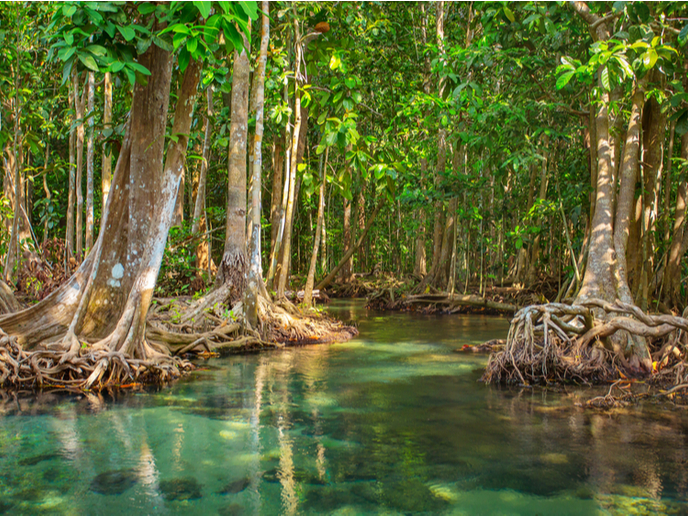Mangroves in the battle against land degradation and water scarcity
Birds in flight, termite mounds and burrs – these are just some of the natural phenomena that scientists have looked to for technological inspiration. By imitating nature, they have been able to solve many challenges, providing society with practical applications ranging from aeroplanes and green buildings to Velcro. In a more recent example of biomimicry, researchers supported by the EU-funded HYDROUSA project have used mangroves as their source of inspiration to tackle the problem of land degradation and water scarcity in coastal areas in the Mediterranean.
Mangrove-inspired desalination
Called Mangrove Still, the mangrove-inspired technology platform was developed by HYDROUSA project partner Planet. According to environmental engineer and Planet co-founder Alessandro Bianciardi, mangrove trees grow in saline water and are the first to colonise an empty coast because they’re able to desalinate water. As they grow, the mangroves create conditions conducive for other species to thrive, and, together with these species, they gradually build an entire ecosystem where none had existed. The idea, as Bianciardi goes on to explain in an episode(opens in new window) of the CNBC TV show ‘Sustainable Energy’, was to reproduce this process using technology. The team improved current solar still technology by looking at how plants absorb light, how they use capillarity to suck up water, and how certain organisms regulate temperature or absorb moisture from the air. The Mangrove Still generates distilled water from saline water through a process of evaporation and condensation run by sunlight. Through this innovative technology, saline water can be used to grow crops and could also be used to regenerate land in regions where it’s no longer productive. Besides the reclaimed water for irrigation, the still will also produce edible salt.
Application beyond the Mediterranean
In recognition of the low-cost, bio-inspired desalination solution, the Middle East Desalination Research Center (MEDRC) in Oman has awarded Planet USD 90 000 (EUR 75 000) in funding to further develop the technology for the Middle Eastern environment. The Mangrove Still could provide an affordable and sustainable solution to farmers in Oman, where saline water intrusion affects water and soil quality. “This funding will enable us to thoroughly test new materials and processes in a scientific environment allowing our team to work on increasing the efficiency and effectiveness of our solar desalination system,” stated Planet’s other co-founder Alessandro Villa in a news item(opens in new window) posted on the MEDRC website. The Mangrove Still demo site is located on Tinos, an island in Greece. The HYDROUSA (Demonstration of water loops with innovative regenerative business models for the Mediterranean region) project has another five demo sites on the Greek islands of Tinos, Lesvos and Mykonos. The second demo site on Tinos consists of rainwater and vapour water recovery systems installed in an eco-tourist resort. The two demo sites on Lesvos deal with wastewater treatment and agroforestry, while the two Mykonos sites demonstrate subsurface and residential rainwater harvesting systems. For more information, please see: HYDROUSA project website(opens in new window)



